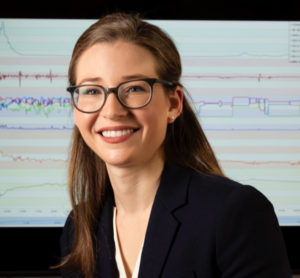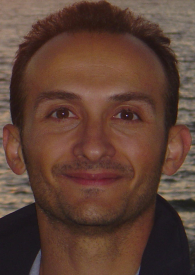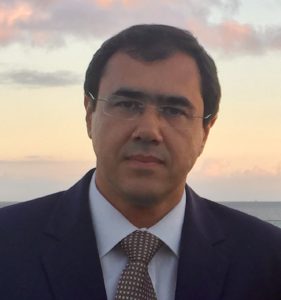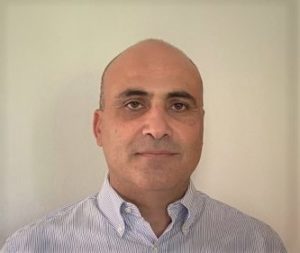Day 1 • 4 October 2021
- Dr. Ilkka Korhonen, Firstbeat Technologies and Tampere University
- Dr. Yuan-ting Zhang, Hong Kong Centre for Cerebro-Cardiovascular Health Engineering and City University of Hong Kong , HKSAR, China
- Dr. Constantinos S. Pattichis, University of Cyprus
- Dr. Ricardo Jardim-Goncalves, NOVA University Lisbon
- Dr. Stephen T. C. Wong, Houston Methodist
- Dr. Dimitrios I. Fotiadis, University of Ioannina
- Dr. Paolo Bonato, Harvard Medical School
- Dr. Omer T. Inan, Georgia Tech
- Dr. Jessilyn Dunn, Duke University
- Mr. Aditya Vaidyam, Beth Israel Deaconess Medical Center
Day 2 • 5 October 2021
- Dr. Axel Krieger, Johns Hopkins University
- Dr. David A. Clifton, University of Oxford
- Dr. Maurice A. Ramirez, RAIsonance
- Ms. Christine Miyachi, IEEE Future Directions
- Dr. Fei Wang, Cornell University
Day 3 • 6 October 2021
- Dr. Roberto Saracco, IEEE Future Directions
- Dr. Carolyn McGregor, Ontario Tech University
- Dr. Ahmed A. Metwally, Illumina AI Laboratory
- Dr. Elebeoba E. May, University of Houston
- Dr. Mario Flores, University of Texas at San Antonio
- Dr. Despina Moschou, University of Bath
- Dr. Kristen Beck, IBM
Day 4 • 7 October 2021
- Dr. Andrew Laine, Columbia University
- Dr. John Torous, Beth Israel Deaconess Medical Center
- Dr. Holly Brugge Jimison, Northeastern University
- Dr. Giancarlo Fortino, University of Calabria
 Dr. Kristen Beck, Lead Bioinformatician, AI and Cognitive Solutions, IBM Research, Alden, USA
Dr. Kristen Beck, Lead Bioinformatician, AI and Cognitive Solutions, IBM Research, Alden, USA
Talk Title: Semi-supervised Identification of SARS-CoV-2 Molecular Targets
Abstract: At the onset of the COVID-19 pandemic, the microbiological research community steeled itself for what has resulted in one of the largest pandemics in recorded history. Conducting research under these conditions came with many challenges, but teams across the world leveraged existing tools and resources to aid in understanding and fighting this deadly virus. SARS-CoV-2 genomic sequencing efforts scaled dramatically to address the current global pandemic and aid public health shedding light on mutations affecting disease progression and on transmissibility across regions. In this work, we analyzed an initial corpus of 66,000 SARS-CoV-2 genome sequences collected from labs across the world. We developed a novel semi-supervised pipeline for automated gene, protein, and functional domain annotation of SARS-CoV-2 genomes that differentiates itself by not relying on the use of a single reference genome and by overcoming atypical genomic traits that challenge traditional bioinformatic methods. Using this method, we identified the comprehensive set of known proteins with 98.5% set membership accuracy and 99.1% accuracy in length prediction compared to proteome references including Replicase polyprotein 1ab (with its transcriptional slippage site). Our method generated 13,000,000 gene, protein, and domain sequences— some conserved across time and geography while others represent emerging variants. We observed 3,362 non-redundant sequences per protein on average within this corpus and describe key D614G and N501Y variants spatiotemporally in the initial genome corpus. For spike glycoprotein domains, we achieved greater than 97.9% sequence identity to references and characterized Receptor Binding Domain variants. We further demonstrate the robustness and extensibility of our method on an additional 4,000 variant diverse genomes containing all named variants of concern and interest as of August 2021. In this cohort, we successfully identified all keystone spike glycoprotein mutations in our predicted protein sequences with greater than 99% accuracy as well as demonstrating high accuracy of protein and domain annotations. This work comprehensively presents the molecular targets to refine biomedical interventions for SARS-CoV-2 with a scalable high-accuracy method to analyze newly sequenced infections as they arise.
Bio-sketch: Dr. Beck is the Lead Bioinformatician and Research Staff Member in the AI and Cognitive Solutions group at IBM Research – Almaden. She has over ten years of experience in biomedical and food-related research including mechanistic studies of omega-3 fatty acids in tumorigenesis and anomaly detection for the microbiome. Her work leverages a multi-omics approach for large scale analysis of genomics, transcriptomics, and the microbiome. Currently, Dr. Beck leads the IBM Functional Genomics Platform team in the development of a repository of over 300 million sequences describing microbial life from genotype to phenotype. Dr. Beck is an advocate for inclusivity in STEM and an active volunteer in many initiatives empowering young researchers. She received a Ph.D. in Biochemistry, Molecular, Cellular, and Developmental Biology with a Designated Emphasis in Biotechnology from the University of California, Davis.
 Dr. David A. Clifton, Professor of Clinical Machine Learning, University of Oxford, Fellow of the Royal Academy of Engineering, Fellow of the Alan Turing Institute, UK
Dr. David A. Clifton, Professor of Clinical Machine Learning, University of Oxford, Fellow of the Royal Academy of Engineering, Fellow of the Alan Turing Institute, UK
Talk Title: Advances in Non-imaging ML for Pandemics
Abstract: As healthcare data are routinely acquired in ever-growing quantities, there exists an opportunity to construct tools that use such data for the care of patients – particularly during pandemics. New classes of AI algorithms are required to help humans understand and model these complex datasets, which now include recordings from millions of patients. This seminar will introduce new developments in the rapidly-growing field of (non-imaging) “Clinical AI”, demonstrating how data scientists can benefit from having “AI to help train the AI”; that is, machine learning networks involved in the construction of new machine learning networks. It will demonstrate successful projects around the COVID-19 response that have been translated into healthcare practice, and highlight ongoing international developments in the field, with examples from collaborative work between our lab and the UK National Health Service.
Bio-sketch: David A. Clifton is Professor of Clinical Machine Learning in the Department of Engineering Science of the University of Oxford, and OCC Fellow in AI & Machine Learning at Reuben College, Oxford. He is a Research Fellow of the Royal Academy of Engineering, Fellow of the Alan Turing Institute (the UK national academy for data science), Visiting Chair in AI for Healthcare at the University of Manchester, and a Fellow of Fudan University, China.
He studied Information Engineering at Oxford’s Department of Engineering Science. His research focuses on the development of machine learning for tracking the health of complex systems. His previous research resulted in patented systems for jet-engine health monitoring, used with the engines of the Airbus A380, the Boeing 787 “Dreamliner”, and the Eurofighter Typhoon. Since 2008, he has focused mostly on the development of AI-based methods for healthcare. Patents arising from this collaborative research have been commercialized via university spin-out companies OBS Medical, Oxehealth, and Sensyne Health, in addition to collaboration with multinational industrial bodies. He holds a Grand Challenge award from the UK Engineering and Physical Sciences Research Council, which is an EPSRC Fellowship that provides long-term strategic support for “future leaders in healthcare”. His research has been awarded over 35 academic prizes; he was a joint winner of the inaugural “Vice-Chancellor’s Innovation Prize”, which identifies the best interdisciplinary research across the entirety of the University of Oxford.
 Dr. Jessilyn Dunn, IEEE JBHI Managing Editor/ Assistant Professor of BME and Biostatistics & Bioinformatics, Duke University, USA
Dr. Jessilyn Dunn, IEEE JBHI Managing Editor/ Assistant Professor of BME and Biostatistics & Bioinformatics, Duke University, USA
Talk Title: Digital Biomarkers of Respiratory Infection
Abstract: Dr. Dunn is PI of the CDC-funded CovIdentify study to detect and monitor COVID-19 using mobile health technologies, and has contributed to the DARPA PROMETHEUS, BIOCHRONICITY, and the ongoing SIGMA+ projects. In this talk, Dr. Dunn will present findings from this research to develop methods to utilize smartwatches for early detection of respiratory infections including COVID-19. These technologies will support intelligently directed diagnostic testing, patient triage, and medical resource allocation to prevent future pandemics and their associated crises.
Bio-sketch: Dr. Jessilyn Dunn is an Assistant Professor of Biomedical Engineering and Biostatistics & Bioinformatics at Duke University. Her primary areas of research focus on biomedical data science and mobile health; her work includes multi-omics, wearable sensor, and electronic health records integration and digital biomarker discovery. Dr. Dunn is the Director of the BIG IDEAs Laboratory, whose goal is to detect, treat, and prevent chronic and acute diseases through digital health innovation. Dr. Dunn was an NIH Big Data to Knowledge (BD2K) Postdoctoral Fellow at Stanford and an NSF Graduate Research Fellow at Georgia Tech and Emory, as well as a visiting scholar at the US Centers for Disease Control and Prevention and the National Cardiovascular Research Institute in Madrid, Spain. Her work has been internationally recognized with media coverage from the NIH Director’s Blog to Wired, Time, and US News and World Report.
 Dr. Mario Flores, Assistant Professor of Electrical and Computer Engineering and Biomedical Engineering at the University of Texas at San Antonio, USA
Dr. Mario Flores, Assistant Professor of Electrical and Computer Engineering and Biomedical Engineering at the University of Texas at San Antonio, USA
Talk Title: Deep Learning in Single Cell Analysis – A Survey of the Application of Deep Learning for scRNA-seq Analysis in the Present Pandemic.
Abstract: Since its selection as the method of the year in 2013, single cell technologies have become mature enough to provide answers to complex research questions. One important area is the study of the present COVID-19 pandemic where single cell technologies have helped elucidate how the innate and adaptive host immune system miscommunicate to worsen the immunopathology produced during this viral infection. Together with the growth of single-cell profiling technologies, there has also been an increase in computational challenges to process the generated datasets. It’s here that by effectively leveraging large data sets, Deep Learning (DL) is positioning as the first option for single-cell analyses. The increasing importance of DL methods applied to scRNA-seq and the lack of a systematic survey in this field raises the need for a review that focuses on the application of deep learning. Our target in this review is to present the recent advances of DL methods for solving the present challenges in scRNA-seq data analysis using a unified mathematical framework. Besides the DL models, we also review the metrics that these methods adopt to evaluate their performances and compile the information of the datasets used by these methods to demonstrate their advantages and utility. We envision that this survey will serve as an important information portal for learning the application of DL for scRNA-seq analysis and inspire innovative use of DL to address a broader range of new challenges in emerging multi-omics and spatial single-cell sequencing.
Bio-sketch: Dr. Flores is Assistant Professor of Electrical and Computer Engineering and Biomedical Engineering at the University of Texas at San Antonio, and joint program Faculty of Biomedical Engineering at the University of Texas Health Science Center. He received his M.S., and Ph.D. in Applied Mathematics and Electrical Engineering (Computational Biology Laboratory) from the University of Texas in 2010 and 2015, respectively. He was also a postdoctoral fellow at the National Center for Biotechnology Information of the National Institutes of Health from 2015 to 2019. His research focuses on DNA and RNA sequence methods, transcriptomics analysis, epigenetics, comparative genomics, and deep learning to study mechanisms of gene regulation. He has developed computational models capable of selective identification of gene regulatory elements and their strength based on sequence-specific signatures of tissue-specific enhancers, reprogramming of regulatory elements, and modulation of gene expression. Currently, he is investigating the mechanisms of gene regulation by transcribed enhancers using several technologies including single-cell RNA-Seq and Natural Language Processing.
 Dr. Giancarlo Fortino, Full Professor of Computer Engineering, Department of Informatics, Modeling, Electronics, and Systems, University of Calabria (Unical), Italy
Dr. Giancarlo Fortino, Full Professor of Computer Engineering, Department of Informatics, Modeling, Electronics, and Systems, University of Calabria (Unical), Italy
Talk Title: Towards AI-based Community-Oriented Wearable Computing Systems: A Paradigm Shift to Monitor and Control (Large-scale) Cooperative Groups
Abstract: Gartner estimates the global smart wearable computing systems (WCS) market will be worth more than US$93 billion in 2022, with an increasing growth caused by the COVID-19. The industry and public sector are then pushing for innovative WCS solutions with high levels of dependability and trustworthiness that can efficiently operate in increasingly complex scenarios. Great strides have been made to realize WCS for the 24/7 monitoring of single users based on 3-tier architectures involving wearables, edge, and cloud systems. However, new requirements, specifically targeting cooperative multiple users, demand for radically new approaches, as promoted by the AI-based community-oriented WCS (CO-WCS). In this keynote, we first provide an overview of WCS based on the SPINE Body of Knowledge research and development (https://projects.dimes.unical.it/spine-bok/). Then, we focus on the requirements of the next-generation AI-based CO-WCS by also using COVID-19 oriented use cases for exemplification. Finally, we will discuss models, architectures, and tools that would be needed to implement CO-WCS.
Bio-sketch: Giancarlo Fortino (SM’12) is a Full Professor of Computer Engineering at the Dept of Informatics, Modeling, Electronics, and Systems of the University of Calabria (Unical), Italy. He received a PhD in Computer Engineering from Unical in 2000. He is also a distinguished professor at Wuhan University of Technology and Huazhong Agricultural University (China), a high-end expert at HUST (China), a senior research fellow at the Italian ICAR-CNR Institute, CAS PIFI visiting scientist at SIAT – Shenzhen, and Distinguished Lecturer for IEEE Sensors Council. He is a Highly Cited Researcher 2020 in Computer Science by Clarivate and has 13500+ citations with h-Index=60 according to Google Scholar. He is the Chair of the PhD School in ICT, the Director of the Postgraduate Master in INTER-IoT and the director of the SPEME lab at Unical as well as co-chair of Joint labs on IoT established between Unical and WUT and SMU and HZAU Chinese universities, respectively. His research interests include wearable computing systems, e-Health, Internet of Things, and agent-based computing. Fortino is currently the scientific responsible of the Digital Health group of the Italian CINI National Laboratory at Unical. He is author of 500+ papers in int’l journals (more than 200 in top-level journals), conferences, and books. He is (founding) series editor of IEEE Press Book Series on Human-Machine Systems and EiC of Springer Internet of Things series and AE of premier int’l journals such as IEEE TAFFC-CS, IEEE THMS, IEEE IoTJ, IEEE SJ, IEEE JBHI, IEEE SMCM, IEEE OJEMB, IEEE OJCS, Information Fusion, JNCA, EAAI, etc. He organized as chair many int’l workshops and conferences (100+), was involved in a huge number of int’l conferences/workshops (500+) as IPC member, is/was guest-editor of many special issues (70+). He is co-founder and CEO of SenSysCal S.r.l., a Unical spinoff focused on innovative IoT systems. Fortino is currently member of the IEEE SMCS BoG and of the IEEE Press BoG, and chair of the IEEE SMCS Italian Chapter.
 Dr. Ricardo Jardim-Goncalves, Full professor, Vice dean for Internacional affairs, Universidade NOVA de Lisboa (FCT NOVA), Portugal
Dr. Ricardo Jardim-Goncalves, Full professor, Vice dean for Internacional affairs, Universidade NOVA de Lisboa (FCT NOVA), Portugal
Talk Title: ICU4Covid – Cyber-Physical Intensive Care Medical System For COVID-19
Abstract: The European health services have well responded to the Covid-19 emerging crisis, especially if and where the Intensive Care Unit (ICU) capacities were sufficient, were prepared and collectively cooperating, sharing knowledge, and were able to protect from further spreading of the disease among the healthcare workforce and the patients. The situation became rapidly and drastically critical, where such conditions could not be ensured. Today, only 47% of hospitals have the recommended coverage of intensive care specialists and they are unevenly distributed between centres and periphery. The pictures from locations, where the situation escalated went around the world in the news and it became evident that de-escalation was nearly impossible once the infection was spread and the healthcare workforce was also affected. Observed mortality rates that are partially mirroring this effect differ roughly between 30% (DIVI Intensivregister (https://www.divi.de/register/tagesreport) and above 50% (ICNARC Case Mix Programme Database 29 May 2020) as in comparison to below 1% with full ICU capacities.
System developers and providers together with clinical and life scientists have now succeeded in rapidly developing and adapting a cyber-physical system for the specific purpose of addressing the Covid-19 challenge to Intensive Care. The developed Cyber-Physical System for Telemedicine and Intensive Care (CPS4TIC) ensures efficient and effective diagnosis and treatment of Covid-19 patients while reducing the risk of infection drastically. It is used at sites, which successfully managed the first wave of Covid-19 for several hundreds of patients and many hundreds of teleconsultations. ICU4Covid advances the developed Cyber-Physical System for Telemedicine and Intensive Care to large-scale piloting and deployment with full involvement of the end-users, hospitals, and health authorities.
The CPS4TIC enables existing or new ICU structures to transform into and operate as one ICU Hub with one central ICU and connected ICUs in peripheral hospitals. The CPS4TIC consists of a telemedicine cockpit, telemedicine consoles at each peripheral hospital, a connector platform, and smart bedside hubs including a robotic arm at the bedsides of both, the central telemonitoring clinics and the peripheral telemonitored hospitals. The ICU hub operates telemedicine, continuous real-time telemonitoring, and a bedside smart care environment. The bedside smart care environment reduces the risk of infection for the health workforce significantly both, for the central and the peripheral hospitals. Several ICU Hubs can cooperate in a cluster to provide additional local/regional support, share knowledge e.g. on updated best practices and intelligence e.g. on Covid-19 induced pathophysiology and mitigating therapeutic strategies.
ICU4Covid will deliver the capacity of ICU that EU citizens deserve and reduce the risk of infection of the medical workforce involved. It will create a powerful infrastructure to diagnose and treat patients of Covid-19 outbreaks best, especially at times, when vaccination and pharmaceutical products are under development and the pandemic with induced political measures have deep impact on the society and economy.
Bio-sketch: Ricardo Jardim-Goncalves is a full professor and the Vice dean for Internacional affairs at Universidade NOVA de Lisboa (FCT NOVA). Dr. Jardim-Goncalves received his PhD degree and habilitation (Agregação) in Industrial Information Systems by the New University of Lisbon (UNL). Research Coordintor at UNINOVA – Instituto de Desenvolvimento de Novas Tecnologia. He graduated with a degree in Computer Science, with an MSc in Operational Research and Systems Engineering. His research activities have been focused on Interoperability of Complex Systems. He has been researching European Commission-funded projects during the last 30 years, with more than 300 papers published in conferences, journals and books. He coordinates major European Commission research projects in the eHealth/Covid area (e.g., Smart4Health, ICU4Covid). Member of the board of UNINOVA, 1st in the ranking of H2020 Research and Development project funds management. Also, he directs GRIS (GRupo para a investigação em Interoperabilidade de Sistemas) at UNINOVA (Instituto para o Desenvolvimento de Novas Tecnologias), and CTS (Centro para as Tecnologias e Sistemas). He is the project leader in ISO TC184/SC4.
![]() >
>
 Dr. Omer T. Inan, Associate Professor of ECE and BME (Adjunct), Linda J. and Mark C. Smith Chair in Bioscience and Bioengineering, Georgia Institute of Technology, EMBS BHI-TC Member, IEEE JBHI Associate Editor, USA
Dr. Omer T. Inan, Associate Professor of ECE and BME (Adjunct), Linda J. and Mark C. Smith Chair in Bioscience and Bioengineering, Georgia Institute of Technology, EMBS BHI-TC Member, IEEE JBHI Associate Editor, USA
Talk Title: Wearable Technologies for Cardiopulmonary Sensing for Infectious Disease Monitoring
Abstract: Dr. Inan’s team is working on two different wearable system designs to advance cardiopulmonary sensing in the field of infectious disease monitoring: (1) a wearable patch with cardiogenic vibration and photoplethysmogram sensing capability is used to capture respiration rate, pulse oximetry, and sympathetic activity to capture early signs of infection; and (2) a wearable system with multiple contact microphones for lung sounds, electrical bioimpedance spectroscopy, skin temperature, and inertial measurements is used for monitoring hospitalized patients to detect tidal volume, respiration rate, and fluid in the lungs.
Bio-sketch: Omer T. Inan is Linda J. and Mark C. Smith Chair in Bioscience and Bioengineering, Associate Professor of Electrical and Computer Engineering, and Adjunct Associate Professor of Biomedical Engineering, at the Georgia Institute of Technology. He received his B.S., M.S., and Ph.D. in Electrical Engineering from Stanford University in 2004, 2005, and 2009, respectively. His research focuses on non-invasive physiological sensing and modulation for human health and performance. He has published 125 journal papers and 135 conference papers / abstracts, and has nine issued patents. His publications have received more than 5,000 citations, with an h-index of 34. Several of his patents have been licensed for commercialization by industry. Dr. Inan, a Senior Member of the IEEE, received the IEEE Sensors Council Young Professional Award, the Office of Naval Research Young Investigator Award, and the NSF CAREER Award in 2018. In 2021, he received an Academy Award for Technical Achievement from The Academy of Motion Picture Arts and Sciences, and the Georgia Tech Outstanding Doctoral Thesis Advisor Award. He is a Three-Time National Collegiate Athletic Association All-American in the discus throw.
 Dr. Holly Brugge Jimison, FACMI, Professor and Director, Consortium on Technology for Proactive Care, Khoury College of Computer Sciences, Bouve College of Health Science, Northeastern University, USA
Dr. Holly Brugge Jimison, FACMI, Professor and Director, Consortium on Technology for Proactive Care, Khoury College of Computer Sciences, Bouve College of Health Science, Northeastern University, USA
Talk Title: Adapting Human Subjects Research to Pandemic Constraints
Abstract: Dr. Jimison will discuss a variety of approaches to modifying human subjects research that would normally occur in a laboratory setting to using mail-out materials and remote video conferencing to achieve sometimes even better results. Potential benefits include improved recruiting of diverse populations, automated recordings of participant interactions with technology, the use of storyboarding to make the experimental logistics more consistent, as well as an improvement in convenience for the researchers and participants.
Bio-sketch: Holly B. Jimison is a professor in both the College of Computer & Information Science and the College of Health Sciences at Northeastern University. Prior to joining Northeastern, she was Technology Advisor for the Office of Behavioral & Social Science Research at NIH. Her earlier work as medical informatics faculty at Oregon Health & Sciences University focused on technology for successful aging and scalable remote care. She served on the Executive Board of the Oregon Center for Aging & Technology and was past president of Oregon’s Health Information Management Systems Society chapter. As a fellow of the American College of Medical Informatics, Professor Jimison has made significant and sustained contributions to the field of biomedical informatics in the areas of pattern recognition, decision support, and consumer health informatics. She continues to deepen her influence in the field through her research on technology for successful aging and scalable remote care for older adults and patients with chronic conditions. As the director of the Consortium on Technology for Proactive Care at Northeastern University, she leads a multidisciplinary, multi-institutional effort to facilitate research in the area of home monitoring of health behaviors, including helping researchers address the challenges of big data related to large amounts of complex and noisy streaming data from multiple sources used to infer clinically relevant health behaviors.
 Dr. Ilkka Korhonen, CTO, Firstbeat Technologies, Adjunct Professor, Faculty of Biomedicine and Health, Tampere University, Finland
Dr. Ilkka Korhonen, CTO, Firstbeat Technologies, Adjunct Professor, Faculty of Biomedicine and Health, Tampere University, Finland
Talk Title: Changes in Lifestyles and Stress Due to COVID-19 Pandemic Measured with Wearable Sensors
Abstract: Advanced computational analysis of wearable sensor data, especially heart rate, heart rate variability, and motion, reveal detailed and accurate lifestyle patterns such as physical activity, sleep, stress, and recovery. In this talk, professor Korhonen will show how wearable sensor data acquired from thousands of individuals show significant changes in lifestyles triggered by the pandemic
Bio-sketch: Professor Ilkka Korhonen is a CTO at Firstbeat Technologies Ltd. He has more than 30 years of expertise in HealthTech, wearables, algorithms and sensing technology, research and translating research into products, partner relations, and business development. Passionate health tech pioneer committed to make the consumer a central user of health information and to use health tech to transform our behaviors to promote health and happiness. Also, earlier, scientific research as a professor in ICT for health with a special focus on personal health systems, eHealth/mHealth, biosignal interpretation, health monitoring, and wearable health sensors, and even decision making based on sensor data in critical care and anesthesia. Several patents and inventions, contribution to several product launches, and business and concept design of commercialized products even during research years. Over 20 years of experience in the management of relations to international industrial partners (IT, medical technology, ODM/OEM) and health and social care partners (hospitals, healthcare, and research institutions). Special strengths in multidisciplinary collaborating, strong and proven ability to efficiently manage and inspire complex networks of divergent skills. He has over 200 international scientific publications, and he is a founding member of IEEE EMBS TC on Wearable Biomedical Sensors and Systems, member of IEEE EMBS TC for Biomedical and Health Informatics, and Senior Member in IEEE EMBS.
 Dr. Axel Krieger, Assistant Professor, Department of Mechanical Engineering, Johns Hopkins University, USA
Dr. Axel Krieger, Assistant Professor, Department of Mechanical Engineering, Johns Hopkins University, USA
Title: From Testing Booths to ICU Robots: Coronovation at the Johns Hopkins University
Abstract: When the Covid pandemic started to hit our JHU hospitals, we engaged in several meetings with frontline providers to learn about clinical needs and brainstorm solutions. We quickly determined that the scarcest resources necessary to fight Covid-19 were trained healthcare workers, personal protective equipment (PPE), and ventilators. Our lab started three Covid-19 projects with the goal of protecting healthcare providers. Presentation topics will include 1) the development and deployment of Covid-19 testing booths, 2) an autonomous robotic ultrasound system for detection and monitoring Covid-19 lung lesions, and 3) a telerobotic system for the operation of ICU ventilators
Bio-sketch: Axel Krieger, Ph.D., joined Johns Hopkins University (JHU) as an Assistant Professor in the Department of Mechanical Engineering in July 2020. He is leading a team of students, scientists, and engineers in the research and development of robotic tools and laparoscopic devices. Projects include the development of a surgical robot called smart tissue autonomous robot (STAR) and the use of 3D printing for surgical planning and patient-specific implants. Professor Krieger is an inventor of over twenty patents and patent applications. Licensees of his patents include medical device start-ups Activ Surgical and PeriCor as well as industry leaders such as Siemens, Philips, and Intuitive Surgical. Before joining the Johns Hopkins University, Professor Axel Krieger was Assistant Professor in Mechanical Engineering at the University of Maryland and Assistant Research Professor and Program Lead for Smart Tools at the Sheikh Zayed Institute for Pediatric Surgical Innovation at Children’s National. He has several years of experience in private industry at Sentinelle Medical Inc and Hologic Inc. His role within these organizations was Product Leader developing devices and software systems from concept to FDA approval and market introduction. Dr. Krieger completed his undergraduate and master’s degrees at the University of Karlsruhe in Germany and his doctorate at Johns Hopkins, where he pioneered an MRI-guided prostate biopsy robot used in over 50 patient procedures at three hospitals.
 Dr. Efthyvoulos Kyriacou, Assistant Professor at the Department of Electrical, Computer Engineering and Informatics, Cyprus University of Technology; Head, eHealth lab, Cyprus University of Technology
Dr. Efthyvoulos Kyriacou, Assistant Professor at the Department of Electrical, Computer Engineering and Informatics, Cyprus University of Technology; Head, eHealth lab, Cyprus University of Technology
Talk Title: Operating an eHealth System for Prehospital and Emergency Health Care Support in Light of Covid-19 (to be co-presented with Prof. Efthyvoulos Kyriacou, Cyprus University of Technology)
Abstract: The purpose of this presentation is to share experience and knowledge gained via an electronic system (eEmergency system) developed, implemented and operated to support, improve, and help the procedure of handling emergency calls, tuned to support prehospital and emergency call handling of Covid-19 cases. It was initially created within the effort to reform the procedures followed for emergency call handling and Ambulance dispatch started on the Island of Cyprus in 2016. The eEmergency system is used by the state Ambulance department and got into regular operation at the end of 2018. One year later, when Covid-19 period started the system was expanded with the addition of several new features related to the handling of patients infected with the new virus. The workload of the department was significantly increased because of covid-19 incidents. A total of 157,730 cases were handled during the last 34 months out of which 13,100 were Covid-19 cases. The cases were increased up to 157% for some months like July 2021; the created eEmergency system supported operations with success.
Bio-sketch: Efthyvoulos Kyriacou is an Assistant Professor at the Department of Electrical, Computer Engineering and Informatics Cyprus University of Technology and Head of the University’s eHealth lab. He received a diploma and Ph.D. in Electrical and Computer Engineering from the National Technical University in Athens Greece in 1996 and 2000 respectively. He has more than 20 years of experience in ehealth systems, emergency telemedicine systems, medical imaging systems and intelligent systems applications in medicine. He has published 45 refereed journals, 105 conference papers, 24 invited book chapters and has one patent in these areas (Citation: 4195, h-index: 31 at Google Scholar, Citations: 2344, h-index: 22 at Scopus Sept 2021). He has been involved in numerous projects in these areas funded by EU, the National Research Foundation of Cyprus, the INTERREG and other bodies. He was Guest Co-Editor of 7 Special Issues. He is a co-editor of the book Ultrasound and Carotid Bifurcation Atherosclerosis, Springer, UK 2012 (66K downloads Bookmetrix Sept. 2021). Moreover, he serves as an Associate Editor of Elsevier-Journal Computer Methods and Programs in Biomedicine. He served as an Associate Editor of the IEEE Trans. on Information Technology in Biomedicine from 2007 to 2010, he serves as a reviewer in many journals related to his research fields. He was the Program Co-chair of ITAB 2009, BIBE 2012, Medicon 2016, Melecon 2016, and was in the program committee of several other scientific conferences. He is a Senior Member of the IEEE and one of the main founders and the first chairman (8/2008-1/2019) of the IEEE Cyprus Engineering in Medicine and Biology/Signal Processing chapter.
 Dr. Andrew Laine, FIEEE, FAIMBE, FINMBE, Percy K. and Vida L. W. Hudson Professor of Biomedical Engineering and Professor of Radiology (Physics), Department of Biomedical Engineering, Columbia University, USA
Dr. Andrew Laine, FIEEE, FAIMBE, FINMBE, Percy K. and Vida L. W. Hudson Professor of Biomedical Engineering and Professor of Radiology (Physics), Department of Biomedical Engineering, Columbia University, USA
Talk Title: Imaging-driven omics Database / Repository on COVID Survivors: Aggregating Data for Retrospective Understanding of COVID Disease and Planning for Future Care.
Abstract: Initial deep / machine learning with limited annotations, cohort size (heterogeneous with respect to co-morbidities) and non-controlled / consistent imaging protocols will require harmonization of data sourced from multiple platforms, hospitals, and vendors.
AI has shown a remarkable ability to generalize and group/tease out patterns from high-dimensional data. However, this should rely not on radiologists alone (poor agreement, new complex disease) but rather on mix-omics integration of imaging and physiological measures. There is an urgent need for multi-modal transfer learning (e.g., understanding lung and heart functional interactions), incremental learning as cohorts grow in states/countries that differ.
We propose that imaging harmonization methods be applied to all discharged COVID patient imaging data. This phenotyping could lead to a better retrospective understanding of COVID disease pathways and prepare for future management of COVID-derived chronic pathologies. There are significant new chronic pathologies expected in COVID survivors (cardiomyopathy, pulmonary aspergillosis, hemoglobin/iron deficiencies) in the longer term, which will be challenging to treat and/or recognize. The harmonized baseline data during the acute phase (US/CXR) and at discharge time (CT/CMR) would help tremendously in our ability to understand the implications of these pathologies.
The proposed harmonization platform would include normalization across vendors, sites, possible variations in protocols, and patient size. During this period of support, the Columbia cohort would harmonize 2,500 subjects in total, sampling in proportion five distinct cohorts. In the long term, we aspire to develop data-sharing tools, with possible partnerships for long term / global infrastructure and computing, integrate expertise in multiple imaging modalities, lead an open AI approach to model, predict and understand stages of COVID-19
Bio-sketch: As director of the Heffner Biomedical Imaging Lab at Columbia, Professor Andrew Laine focuses on medical signal and image processing, computer-aided diagnosis, and biomedical and imaging informatics. His work is based on imaging structures at the molecular, cellular, tissue, and organ levels of analysis. The goal is to develop biomedical technology for unmet clinical needs and to transition that technology into commercial products that will improve healthcare and save lives. Professor Laine was the first to use multiscale “wavelet” representation to enhance subtle details in mammograms. Today, the algorithm he developed in 1992 is used in almost all commercial digital mammography systems. Currently, Laine is applying multiresolution wavelet techniques to classify pulmonary emphysema. He is also collaborating on a project in medical informatics to enable clinicians to better diagnose a patient using both text and annotated findings from medical images. Dr. Laine received a BS in biological science from Cornell University in 1977, an MS in chemistry from the University of Connecticut in 1980, and a DSc in computer science from Washington University, St. Louis, in 1989. He is a fellow of the Institute of Electrical and Electronics Engineers, and a fellow of the International Federation for Medical and Biological Engineering. He is Co-Chair of the Center for Health Analytics in Columbia’s Data Science Institute and past president of IEEE Engineering in Medicine and Biology Society.
 Dr. Elebeoba E. May, Associate Professor, Biomedical Engineering Department, University of Houston, USA
Dr. Elebeoba E. May, Associate Professor, Biomedical Engineering Department, University of Houston, USA
Talk Title: Host Biomedical State and the Development of Multiscale Models of Infection and Disease that can Inform Future Pandemic Preparedness
Abstract: Population-scale transmission models of disease spread rely heavily on observable clinical and demographic factors, and leverage epidemiology data from population surveillance studies. Although the macroscale approach to modeling infection can effectively predict spread, infection, host response, and the occurrence of the disease is an emergent property resulting from the interaction of multiple systems across multiple scales. Furthermore, differences in individual health conditions and microbial variations are consequential in disease spread and not always sufficiently represented. Models that integrate variations in host and account for the non-deterministic nature of host-microbial interactions are needed to better inform our understanding of infection and spread. Such understanding will enable us to leverage how we use modeling to prepare for future pandemics.
Towards that end, we developed multiscale models of host-pathogen that can leverage biomedical data such as comorbidity status to predict the molecular to the tissue-scale consequence of Mycobacterium tuberculosis infection. While the tendency is to study microbial pathogens and their host systems separately or from a host or pathogen-centric skew, the nature and dynamics of the interaction between the systems are key determinants in infection outcome. With the goal of understanding host, pathogen, and microenvironment interactions that impact infection outcome, we develop models at multiple scales, including multiscale, agent-based models (ABM) that integrate pathogen adaptation to environmental stress and environment modulation of macrophage immune response. Informed by empirical studies, our models take into account changes in the physiological environment of the host as well as the host intracellular environment. We integrate deterministic and stochastic modeling approaches and use machine learning methods to develop a hybrid modeling platform. Results demonstrate the importance of physiology, microenvironment, and biochemical dynamics in infection outcome, and provide a framework for integrating cellular scale models with host and population models to improve predictions of future infectious disease outbreaks.
Research supported in part by DTRA/HJF # FA8650-10-2-6062/subaward 2381, NIH/NHLBI award K25HL075105, and NSF MCB-1445470.
Bio-sketch: Elebeoba E. May, Ph. D., is an Associate Professor of Biomedical Engineering at the University of Houston’s Cullen College of Engineering and an Associate Affiliate Member of the Department of Pathology and Genomic Medicine at the Houston Methodist Research Institute. Dr. May earned her Ph.D. degree in Computer Engineering from North Carolina State University and prior to joining the University of Houston held an appointment as a Principal Member Technical Staff at Sandia National Laboratories in Albuquerque, NM. She also recently served as a Program Director for the Systems and Synthetic Biology
Cluster in the Division of Molecular and Cellular Biosciences within the NSF Biological Sciences Directorate. As director of the Multi-scale Immunobiology Design, Algorithms, and Simulation (MIDAS) Lab, her research focuses on the design of integrated quantitative and empirical platforms for the development of multi-scale, predictive models of biological and biomolecular systems with an emphasis on host-pathogen interactions, microbial communities, and genetic information processing. Dr. May is a recipient of an NIH/NHLBI K25 Quantitative Research Career Development Award and her research has been supported by grants from the DoE, DTRA, NIH, and NSF.
 Dr. Carolyn McGregor, Research Chair in AI for Health and Wellness Director, Joint Research Centre in AI for Health and Wellness Ontario Tech University, Canada and University of Technology Sydney, Australia
Dr. Carolyn McGregor, Research Chair in AI for Health and Wellness Director, Joint Research Centre in AI for Health and Wellness Ontario Tech University, Canada and University of Technology Sydney, Australia
Talk Title: Pivoting AI for Health and Wellness through Transdisciplinary Innovation to Combat COVID-19
Abstract: COVID-19 has caused a fundamental shift in research and innovation within Canada, Australia and internationally. The Government of Canada issued a call to all researchers to pivot their research focus to combat COVID-19. The rapid establishment of new innovative transdisciplinary collaborations has led to extraordinary new innovations. In this presentation, Professor McGregor will present her transdisciplinary research to combat COVID-19. To assist the impact of COVID-19 on health, she will discuss her work with the Canadian automotive industry to pivot to make ventilators and the opportunities and challenges for deployment and AI-based analytics. She will present her work analyzing wellness changes in the face of COVID-19 on patient aggression behavior in mental health facilities. The use of new survival analysis AI techniques will be demonstrated for new approaches to public health analytics for COVID-19 and the importance of reducing the time period from symptom onset to notification of the positive result.
Bio-sketch: Professor Carolyn McGregor is the Research Chair in Artificial Intelligence for Health and Wellness, Research Excellence Chair in Health Informatics, and a two-time Canada Research Chair in Health Informatics at Ontario Tech University. She is the Founding Director of the Joint Research Centre in Artificial Intelligence for Health and Wellness between Ontario Tech University in Canada and University of Technology, Sydney in Australia. Professor McGregor has led pioneering research in Big Data analytics, artificial intelligence, deep learning, Internet of Things, edge computing, temporal data mining, and health analytics as a service. She now progresses this research within the context of critical care medicine, precision public health, mental health, astronaut health, and military and civilian tactical training. She is the inventor and leads on two international award-winning AI-driven Big Data analytics platforms for health and wellness, Artemis and Athena.
She has over 200 refereed publications, 3 patents in multiple jurisdictions, and has established two startup companies resulting from her research. In 2014 she was awarded membership in the Order of Australia (AM) for her significant service to science and innovation through health care information systems. In 2017 she was featured in the 150 Stories series commissioned by the Lieutenant Governor of Ontario and the Government of Canada to commemorate the 150th year anniversary of Ontario. In 2018 she was named as a Women Leader in Digital Health by Digital Health Canada.
 Dr. Ahmed Abdelhadi Metwally, Senior AI, Bioinformatics Scientist, Illumina Artificial Intelligence Laboratory, USA
Dr. Ahmed Abdelhadi Metwally, Senior AI, Bioinformatics Scientist, Illumina Artificial Intelligence Laboratory, USA
Talk Title: Pre-symptomatic Detection of COVID-19 from Smartwatch Data
Abstract: Wearable devices digitally measuring vital signs have been used for monitoring health and illness onset and have a high potential for real-time monitoring and disease detection. As such, they are potentially useful during public health crises, such as the current COVID-19 global pandemic. In this talk, Dr. Metwally will discuss how wearable sensors can be used as a tool to early detect COVID19 onset using physiological and activity data. He will show how the majority of the COVID-19 cases could be detected before symptom onset in real-time via the occurrence of extreme elevations in resting heart rate relative to the individual baseline. The findings suggest that consumer wearables may be used for the large-scale real-time detection of respiratory infections, often pre-symptomatically, and provide an approach for managing epidemics using digital tracking and health monitoring.
Bio-sketch: Dr. Metwally is a senior AI/Bioinformatics scientist at Illumina AI Laboratory. Before joining Illumina, he was a postdoctoral scholar in the Snyder lab at Stanford University. His research is focused on developing novel machine learning methods for longitudinal multimodal biomedical data fusion (omics and wearable biosensors data) to early detect cardiometabolic and infectious diseases and personalize their treatments. Dr. Metwally received his Ph.D. in Bioinformatics/Bioengineering and MS in Computer Science (focused on Deep Learning), both from the University of Illinois at Chicago (UIC) in 2018. He received his BS/MS in Biomedical Engineering, Cairo University, Egypt. Dr. Metwally’s work has been published in prestigious journals such as Nature Biomedical Engineering, Nature, Cell, Nature Communications, etc. He was elected globally to serve as the global student representative (2017-2019) and board member of the Administrative Committee of the IEEE Engineering in Medicine and Biology Society (EMBS). He was leading the Stanford Wearable Electronics Initiative (2018-2020). Dr. Metwally has received numerous awards, such as NIH Predoctoral Translational Scientist fellowship, ISMB’20 best talk award, Stanford COVID-19 RISE award, second-place award at Stanford Health++ Hackathon, and many travel awards NSF, IEEE, ISCB, and UIUC for various educational and scholarly activities.
 Ms. Christine Miyachi, IEEE Future Directions Committee Chair, USA
Ms. Christine Miyachi, IEEE Future Directions Committee Chair, USA
Talk Title: Learn How Nuance is Using AI to Help Solve Sub‑optimal Patient Care, Clinician Burnout and Missed Reimbursement and Financial Pressures by Automating Electronic Health Record Creation
Biosketch: Christine Miyachi is an experienced software architect and technical manager, and her career spans working for large companies like Xerox, and several startups. She is a Software Development Manager at Nuance Communications where she works on AI systems for healthcare. After serving several leadership and editorial roles at the IEEE, she currently is chair of IEEE Future Directions Committee (https://www.ieee.org/about/technologies.html). In addition, she writes a blog about software architecture: http://abstractsoftware.blogspot.com/. Miyachi graduated from the University of Rochester with a BS in electrical engineering. She holds two MIT degrees: an MS in technology and policy/electrical engineering and computer science and an MS in System Design and Management. See more about Chris at www.christinemiyachi.com
 Dr. Despina Moschou, Royal Academy of Engineering Industrial Fellow, Lecturer, Centre for Biosensors, Bioelectronics and Biodevices (C3Bio), Department of Electronic & Electrical Engineering at the University of Bath, UK
Dr. Despina Moschou, Royal Academy of Engineering Industrial Fellow, Lecturer, Centre for Biosensors, Bioelectronics and Biodevices (C3Bio), Department of Electronic & Electrical Engineering at the University of Bath, UK
Talk Title: Lab-on-PCB Technology and the COVID-19 Outbreak Case Study
Abstract: Lab-on-Chip technology aspires to shrink biomedical laboratories in few cm microchips, in a technological revolution step analogous to the introduction of computer technology in the 20th century. In this presentation, Dr. Moschou will provide an overview of this technology and its impact on healthcare. She will then focus on manufacturing techniques for integrated Lab-on-Chip biomedical diagnostic chips and in particular the Lab-on-PCB technology that has been the forefront of her work for the past 8 years. The role of this technology in the COVID-19 outbreak will be presented, along with its potential in reshaping the future of testing and data-driven management of emerging pandemics.
Bio-sketch: Dr. Despina Moschou (MEng, Ph.D.) is a Lecturer and Royal Academy of Engineering Industrial Fellow, within the Centre for Biosensors, Bioelectronics and Biodevices (C3Bio), Department of Electronic & Electrical Engineering at the University of Bath, UK (https://www.bath.ac.uk/research-centres/centre-for-biosensors-bioelectronics-and-biodevices/). Since 2010, her main research focus has been to apply her microfabrication and microelectronic device expertise in the development of disposable Lab-On-a-Chip systems for bioanalytical applications (molecular and immunoassay-based Point-of-Care diagnostic devices). For the past 11 years, she has been pursuing the Lab-on-Printed Circuit Board approach, in an effort to realize mass-manufacturable, electronics-enabled Lab-on-Chip microsystems, engaging with stakeholders across all related disciplines (clinical scientists, microbiologists, chemists, manufacturers, engineers, diagnostic industries).
 Dr. Constantinos S. Pattichis, Professor, Dep. of Computer Science, Director of the Biomedical Engineering Research Centre, University of Cyprus; Leader of HealthXR Smart, Ubiquitous, and Participatory Technologies for Healthcare Innovation, CYENS Centre of Excellence, Cyprus
Dr. Constantinos S. Pattichis, Professor, Dep. of Computer Science, Director of the Biomedical Engineering Research Centre, University of Cyprus; Leader of HealthXR Smart, Ubiquitous, and Participatory Technologies for Healthcare Innovation, CYENS Centre of Excellence, Cyprus
Talk Title: Operating an eHealth System for Prehospital and Emergency Health Care Support in Light of Covid-19 (to be co-presented with Prof. Efthyvoulos Kyriacou, Cyprus University of Technology)
Abstract: The purpose of this presentation is to share experience and knowledge gained via an electronic system (eEmergency system) developed, implemented, and operated to support, improve, and help the procedure of handling emergency calls, tuned to support prehospital and emergency call handling of Covid-19 cases. It was initially created within the effort to reform the procedures followed for emergency call handling and Ambulance dispatch started on the Island of Cyprus in 2016. The eEmergency system is used by the state Ambulance department and got into regular operation at the end of 2018. One year later, when Covid-19 period started the system was expanded with the addition of several new features related to the handling of patients infected with the new virus. The workload of the department was significantly increased because of covid-19 incidents. A total of 157,730 cases were handled during the last 34 months out of which 13,100 were Covid-19 cases. The cases were increased up to 157% for some months like July 2021; the created eEmergency system supported operations with success.
Bio-sketch: Professor Constantinos S. Pattichis has 30 years of experience in eHealth and connected health, medical imaging, biosignal analysis, intelligent systems, and explainable AI, and more recently in mHealth interventions based on X Reality applications. He has been involved in numerous projects in these areas funded by EU and other bodies, with total funding managed more than 14 million Euro. He is the leading technical coordinator of the EU Digital Covid Certificate platform (see eudcc.gov.cy) for Cyprus that was used by more than 500,000 citizens for issuing their certificates. He is also leading the “Deployment of Generic Cross Border eHealth Services in Cyprus”, an EU Innovation and Networks Executive Agency (INEA), Connecting Europe Facility (CEF), funded project where 23-member states participate. More recently, he was awarded as Co-PI the development and implementation of a highly competitive national integrated project entitled “Integrated National eHealth Ecosystem (eHealth4U)”, that targets to develop the national eHealth infrastructure based on strict adherence to interoperability protocols for the offering of advanced big-data eHealth services. He has published 125 journal publications, 232 conference papers, and 30 chapters in books in these areas (no. of citations more than 10,000, h-score 51). He is/was General Co-Chair of IEEE International Conference on Biomedical and Health Informatics BHI2021 and CAIP 2021, Program Co-chair of the IEEE BHI2019 and BHI2018, IEEE Computer-Based Medical Systems (CBMS2017), General Co-chair of the IEEE 4th Middle East Conference on Biomedical Engineering (MECBME 2018), IEEE International Conferences on Information Technology Applications in Biomedicine (ITAB 2009), Bioinformatics and Bioengineering (BIBE 2012), and 13th Medical and Biological Engineering and Computing (Medicon 2016). He is a Fellow of IEEE, IET, International Academy of Medical and Biomedical Engineering (IAMBE), and European Alliance for Medical & Biological Engineering & Science (EAMBES).
 Dr. Maurice A. Ramirez, Chief Medical Officer, Chief Scientist, RAIsonance, Inc., USA
Dr. Maurice A. Ramirez, Chief Medical Officer, Chief Scientist, RAIsonance, Inc., USA
Talk Title: Artificial Intelligence for Applying Lessons Learned in Disaster and Pandemic
Abstract: Every disaster response, including the current pandemic, generates lessons with the potential to save lives every day. The goal of every emergency manager, planner, and public health official is to gain perspectives and insights drawn from the positive and negative experiences of others as they respond to the disaster at hand. Unfortunately, these lessons are not all the same and often are not all even seen. These lessons include: lessons occurred – those lessons that occur, but go unnoticed; lessons observed – those lessons that occur, are observed and then forgotten; lessons learned – those lessons that are observed, are shared and collect dust; lessons applied – those lessons acted upon the day after the conference
The only lessons that truly matter and the only lessons that pay dividends are the lessons that are applied.
Many of these lessons are memorialized in daily after-action reports (AARs) from each responding agency and unit. Upon demobilization, AARs are also generated from every contractor and Federal employee responding to a disaster. A two-week Federal response can generate well over 20,000 AAARs that must be collated, reviewed and important observations turned into lessons for future preparedness efforts. Estimates are that the current pandemic response has generated will over 1 million AARs in 2020 alone. Often the most important lesson are only seen by a small number of responders or even a single responder. It is not only important to observe and learn the lesson because the only lessons that matter are those lessons applied, in an ideal world, the lessons would be applied during the disaster response that generated the lesson.
AI has the ability to review AARs and adjudicate all the lessons learned to find not only the most frequently observed but also the most impactful lessons. These lessons have historically been applied to preparedness for the NEXT disaster, however, AI offers the additional benefit of reviewing AARs IN REAL TIME thus providing lessons to apply during the pandemic.
Bio-sketch: Dr. Maurice A. Ramirez is the Chief Medical Officer and Chief Scientist for RAIsonance, Inc., (www.raisonance.ai), a family of artificial intelligence/machine learning companies focused on medical diagnostics, biometric authentication, and big data natural language processing.
The company is very close to kicking off its EUA clinical trials and soon thereafter submitting its EUA application for a new, software-only COVID-19 diagnostic. The device, called AudibleHealthDx, is in fact an AI SaMD Diagnostic that analyzes a person’s forced cough vocalization to detect a COVID signature. It takes the form of a mobile phone app that will be available on both the Google and Apple app stores. The promise of this device is that if approved, it would be possible to deploy COVID-19 testing in an almost infinitely scalable format all over the globe since the device requires no supplies, chemicals, lab processing, shipping, etc.
In 2017, Dr. Ramirez was the first person to receive the Lifetime Achievement Award in Disaster Medicine for his contributions to healthcare security and disaster medical response worldwide.
Board-certified in nine specialties, and board-eligible in Artificial Intelligence Medicine, Dr. Ramirez is a former Senior Physician/Federal Medical Officer, Emergency Room Doctor, Disaster Medicine Specialist, and Bioterrorism/Hazmat expert with clinical and field response experience spanning over 2 decades.
Dr. Ramirez also serves as Emeritus Medical Director of the High Alert Institute team that is reviewed the whole of the antiviral repurposing scientific literature to identify possible treaments for COVID-19, Dr. Ramriez has published numerous articles in professional and scientific journals and has been cited in over 24 textbooks. Dr. Ramirez is the author of The Complete Idiot’s Guide to Disaster Preparedness (Alpha Books, 2009) and Making Sense of Disaster Medicine (Oxford Univ. Press, 2010). He was the Technical Advisor for Spike TV’s: Surviving Disaster and 1000 Ways to Die.
 Dr. Roberto Saracco, Digital Reality Initiative co-Chair – Future Direction Committee, Italy
Dr. Roberto Saracco, Digital Reality Initiative co-Chair – Future Direction Committee, Italy
Talk Title: Use of Personal Digital Twin in Epidemic Monitoring and Control
Abstract: The IEEE FDC Digital Reality Initiative has studied the application of Personal Digital Twins to the area of epidemic monitoring and control. The use of personal location data, already available through smartphone GPS and proximity sensors, coupled with data derived from Health Institute would allow the analyses and assessment of contagion risks. These assessments can be considered in the framework created by Government Institutions to provide awareness to individuals and to steer their social behavior in the proper direction. The whole system protects individual privacy of data up to the point when the behavior remains within the allowed framework.
The talk presents this idea with particular emphasis on the need to create people’s awareness, particularly at this stage of the epidemics.
Bio-sketch: Roberto Saracco fell in love with technology and its implications a long time ago. His background is in math and computer science. Until April 2017 he led the EIT Digital Italian Node and then was head of the Industrial Doctoral School of EIT Digital up to September 2018. Previously, up to December 2011, he was the Director of the Telecom Italia Future Centre in Venice, looking at the interplay of technology evolution, economics, and society. At the turn of the century, he led a World Bank-Infodev project to stimulate entrepreneurship in Latin America.
He teaches a Master’s course on Technology Forecasting and Market impact at the University of Trento and serves as Senior Advisor of the Reply Group.
He is a senior member of IEEE where he leads the Industry Advisory Board within the Future Directions Committee and co-chairs the Digital Reality fostering Digital Transformation Initiative. He is a COMSOC Distinguished Lecturer and in 2021 he is Chair-Elect for the New Initiative Committee.
He has published over 200 papers in journals and magazines and 30 books/ebooks.
He writes a daily blog, https://cmte.ieee.org/futuredirections/category/blog/, with commentary on innovation in various technology and market areas.
 Dr. John Torous, Director of the Digital Psychiatry Division, Department of Psychiatry, Beth Israel Deaconess Medical Center, USA
Dr. John Torous, Director of the Digital Psychiatry Division, Department of Psychiatry, Beth Israel Deaconess Medical Center, USA
Talk Title: How to Select Apps to Deal with Mental Health Challenges Post-Pandemic
Bio-sketch: John Torous, MD MBI is director of the digital psychiatry division, in the Department of Psychiatry at Beth Israel Deaconess Medical Center, a Harvard Medical School-affiliated teaching hospital, where he also serves as a staff psychiatrist and assistant professor. He has a background in electrical engineering and computer sciences and received an undergraduate degree in the field from UC Berkeley before attending medical school at UC San Diego. He completed his psychiatry residency, fellowship in clinical informatics, and master’s degree in biomedical informatics at Harvard. Dr. Torous is active in investigating the potential of mobile mental health technologies for psychiatry and has published over 200 peer-reviewed articles and 5 books chapters on the topic. He serves as editor-in-chief for JMIR Mental Health (http://mental.jmir.org/), web editor for JAMA Psychiatry, currently leads the American Psychiatric Association’s Health IT Committee, and is a senior member in IEEE.
 Mr. Aditya Vaidyam, Clinical Research Assistant,Division of Digital Psychiatry at the Beth Israel Deaconess Medical Center, USA
Mr. Aditya Vaidyam, Clinical Research Assistant,Division of Digital Psychiatry at the Beth Israel Deaconess Medical Center, USA
Talk Title: The LAMP Platform: Harnessing Digital Phenotyping of Patient-Generated Health Data in Clinical Care during the COVID-19 Pandemic
Abstract: The COVID-19 pandemic highlights the need for the integration of patient-generated health data (PGHD) in clinical care to enable actionable clinical insight towards shared decision-making and improved clinical outcomes. However, technical and organizational challenges preclude the effective use of PGHD generated from patient-owned smartphones and wearable devices, including the lack of standards and easy-to-use tools. Through supporting research, data analysis, and implementation around PGHD as an open-source solution with freely accessible and shared code, the LAMP Platform addresses these challenges. It further enables interoperability with existing FHIR-based healthcare systems and off-the-shelf wearables and services such as Apple HealthKit and Google Fit. Incorporating feedback from patients and clinicians alongside a standards-based approach, the LAMP Platform addresses needs across a wide range of use-cases through flexible and customizable components. It supports many use-cases from simple surveys, to clinical delivery of mindfulness exercises, to personalized just-in-time adaptive interventions. The versatility of the LAMP Platform, together with Cortex, its artificial intelligence, and data analysis toolkit, allows effective integration of PGHD and digital phenotyping in clinical practice during COVID-19 and future pandemics.
Bio-Sketch: Aditya Vaidyam is a clinical research assistant at the Divison of Digital Psychiatry at Beth Israel Deaconess Medical Center. His research focus ranges from engineering and architecting healthcare systems that improve access and quality of care to investigating the underlying symptomatology of mental illness. As a principal architect of the LAMP Platform, Vaidyam focuses on elucidating the key design goals of a healthcare platform that supports personalized just-in-time adaptive interventions and digital phenotyping in populations with serious mental illnesses such as schizophrenia. In clinical research, Vaidyam focuses on the use of machine learning algorithms for longitudinal data analysis and personalized interventions for mindfulness and patient education. Vaidyam also investigates the digital therapeutic alliance as manifested in non-conventional digital formats, such as voice assistants, as well as the needs, requirements, and barriers to adoption in patients with serious mental illness. Vaidyam assisted in developing a program for digital skills training to help patients with limited technical experience access and rely on digital tools and apps assisting them in managing their physical or mental health. Vaidyam holds a BS in neurobiology & physiology and computer science from Purdue University, as well as an MS in medical science from Boston University.
 Dr. Fei Wang, Associate Professor in Division of Health Informatics, Department of Healthcare Policy and Research, Weill Cornell Medicine, Cornell University, USA
Dr. Fei Wang, Associate Professor in Division of Health Informatics, Department of Healthcare Policy and Research, Weill Cornell Medicine, Cornell University, USA
Talk Title: Exploring the Clinical Complexity of COVID-19 with Machine Learning
Abstract: COVID-19 has demonstrated extreme complexity in its clinical manifestations. Understanding the patterns of such clinical complexity can shed light on the distinct underlying pathophysiological mechanisms and inform effective targeted treatments. In this talk I will introduce a series of research my lab has done during the past year on exploring such complexity with patient electronic health records using machine learning, especially on the predictive modeling and characterization of COVID-19 related phenotypes. In-depth discussions on the implications and future directions will also be presented.
Bio-sketch: Fei Wang is an Associate Professor in Division of Health Informatics, Department of Healthcare Policy and Research, Weill Cornell Medicine, Cornell University. His major research interest is data mining, machine learning, and their applications in health data science. He has published more than 250 papers on the top venues of related areas such as ICML, KDD, NIPS, CVPR, AAAI, IJCAI, etc. His papers have received over 17,000 citations so far with an H-index 62. His (or his students’) papers have won 8 best paper (or nomination) awards at top international conferences on data mining and medical informatics. His team won the championship of the NIPS/Kaggle Challenge on Classification of Clinically Actionable Genetic Mutations in 2017 and Parkinson’s Progression Markers’ Initiative data challenge organized by Michael J. Fox Foundation in 2016. Dr. Wang is the recipient of the NSF CAREER Award in 2018, as well as the inaugural research leadership award in IEEE International Conference on Health Informatics (ICHI) 2019. Dr. Wang’s Research has been supported by NSF, NIH, ONR, PCORI, MJFF, AHA, Amazon, etc. Dr. Wang is the past chair of the Knowledge Discovery and Data Mining working group in American Medical Informatics Association (AMIA). Dr. Wang is a fellow of AMIA.
 Dr. Stephen T. C. Wong, John S. Dunn Presidential Distinguished Chair of BME, Houston Methodist; Professor of Radiology, Neuroscience, Pathology and Laboratory Medicine, Weill Cornell Medicine, USA
Dr. Stephen T. C. Wong, John S. Dunn Presidential Distinguished Chair of BME, Houston Methodist; Professor of Radiology, Neuroscience, Pathology and Laboratory Medicine, Weill Cornell Medicine, USA
Talk Title: Time-Series Recursive Classification for Clinical Decision Making to Improve Outcomes and Resource Allocations of COVID-19 Patients in a Major Health System in Texas
Abstract: In this talk, Dr. Wong will present his team’s effort in applying time-series data and machine learning to provide timely information for clinicians in a major Health system for optimizing treatment strategies, outcomes, and resource allocations during the COVID-19 pandemic before the availability of vaccines. He will also share lessons learned from this experience.
Bio-sketch: Stephen T. C. Wong, Ph.D., PE, holds the John S. Dunn presidential distinguished chair and is the founding chair of Systems Medicine and Bioengineering Department, director of the T.T. & W.F. Chao Center for BRAIN, director of Translational Biophotonics Lab, director of the Cellular and Tissue Microscopy Core Lab, chief research information officer, and associate director of Cancer Center, Houston Methodist Hospital. He is a professor of radiology, neuroscience, pathology, and laboratory medicine at Cornell University.
Wong is also an industrial veteran – his career highlights include: led teams that automated VLSI MB DRAM production (Bell Labs), produced a web trading platform (Charles Schwab), and designed and developed a hospital-wide picture archiving and communication system (UC San Francisco), and headed product development departments at Philips Healthcare. At Harvard, he founded two campus-wide centers, one for bioinformatics research in neurodegeneration at Harvard Medical School, where he pioneered the integration of high content screening and systems biology to delineate disease mechanisms, and the other for functional and molecular imaging at Brigham and Women’s Hospital (BWH), including the creation of the first cyclotron facilities and MRI/PET research imaging cores at BWH. He is a Fellow of IEEE and AMIA and a licensed professional engineer (electrical engineering) in US. He is the Editor of Computerized Medical Imaging and Graphics. Wong dedicated the second half of his life to solving disease problems.
 Dr. Yuan-ting Zhang, Hong Kong Centre for Cerebro-Cardiovascular Health Engineering and City University of Hong Kong , HKSAR, China
Dr. Yuan-ting Zhang, Hong Kong Centre for Cerebro-Cardiovascular Health Engineering and City University of Hong Kong , HKSAR, China
Talk Title: Wearable SUPER-MINDS for Combating CVD and COVID
Abstract: This talk will present firstly some perspectives on the miniaturization, intelligence, network, digitization, and standardization (MINDS) design of wearable and flexible devices with the applications for combating cardiovascular diseases (CVD) and COVID-19. Secondly, using the atherosclerotic plaque assessment as an example, the talk will attempt to illustrate how to integrate wearable sensing with other technologies across multiple scales in the biological hierarchy from molecular, cell, organ to a system for the early prediction of acute CVDs. A multi-Centre clinical trial on Myocardial Infarction & Stroke Screening Of Nations (MISSION) will also be introduced. Finally, the talk will cover some challenges in moving wearable and flexible SUPER-MINDS systems towards a more holistically convergent approach to future healthcare, which principles are characterized by the P8 Health that is Predictive, Personalized, Preventive, Precise, Pervasive, Participatory, Preemptive, and Patient-centered.
Bio-sketch: Professor Yuan-Ting Zhang is currently the Chairman and Director of Hong Kong Center for Cerebro-cardiovascular Health Engineering (COCHE) at HKSTP and the Chair Professor of Biomedical Engineering at City University of Hong Kong. He was the Sensing System Architect in Health Technology at Apple Inc., California, USA, and the founding Director of the Key Lab for Health Informatics of Chinese Academy of Sciences. Professor Zhang dedicated his service to the Chinese University of Hong Kong from 1994 to 2015 in the Department of Electronic Engineering, where he served as the first Head of the Division of Biomedical Engineering and the founding Director of the Joint Research Center for Biomedical Engineering. Prof. Zhang was the Editor-in-Chief for IEEE Transactions on Information Technology in Biomedicine and the founding Editor-in-Chief of IEEE Journal of Biomedical and Health Informatics. He served as Vice President of IEEE EMBS, Chair of 2016-2018 IEEE Award Committee in Biomedical Engineering, Technical Program Committee Chair of EMBC’98 in Hong Kong, Conference Chair of EMBC’05 in Shanghai, International Committee Co-Chair of EMBC’07 in Lyon, International Committee Chair of EMBC’ 11 in Boston, International Committee Chair of EMBC’13 in Osaka, Technical Program Committee Co-Chair of EMBC’17 in Jeju Island, and International Program Co-Chair for EMBC’2020 in Montreal Canada. He was invited to give keynote talks at various international conferences worldwide including at the First IEEE Life Sciences Grand Challenges Conference held at the National Academy of Sciences in Washington DC in 2012 and at the 40th IEEE-EMBS Annual International Conference (EMBC’18) in Hawaii in 2018. Prof. Zhang is currently the Editor-in-Chief for IEEE Reviews in Biomedical Engineering, Chair of the Working Group for the development of IEEE 1708 Standard on Wearable Cuffless Blood Pressure Measuring Devices, a member of Award Committees for International Academy of Medical and Biological Engineering (IAMBE), and the Conference Chair for IEEE Summer School and Symposium Series on Medical Devices and Biosensors in conjunction with the International Conference on Cerebro-cardiovascular Health Engineering (MDBS-CHE).
Prof. Zhang’s research interests include cardiovascular health engineering, unobtrusive sensing and wearable devices, neural muscular modeling and pHealth technologies. He was selected on the 2014, 2015, 2016, 2017, 2018, and 2019 lists of China’s Most Cited Researchers by Elsevier. He won a number of international awards including IEEE-EMBS best journal paper awards, IEEE-EMBS Outstanding Service Award, IEEE-SA 2014 Emerging Technology Award. He is a member of Sigma Xi. Prof. Zhang was elected to be IAMBE Fellow, IEEE Fellow, and AIMBE Fellow for his contributions to the development of wearable and m-Health technologies.
